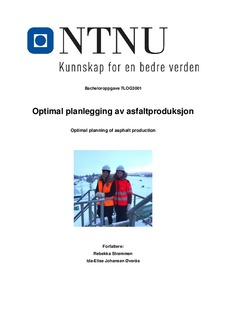| dc.contributor.advisor | Wexsahl, Asbjørn J. | |
| dc.contributor.author | Strømmen, Rebekka | |
| dc.contributor.author | Øverås, Ida-Elise | |
| dc.date.accessioned | 2019-08-24T14:02:53Z | |
| dc.date.available | 2019-08-24T14:02:53Z | |
| dc.date.issued | 2019 | |
| dc.identifier.uri | http://hdl.handle.net/11250/2610687 | |
| dc.description.abstract | Bedriften Veidekke har ingen systemstøtte for planlegging av asfaltproduksjon. De ulike arbeidsoppgavene krever ulike systemer. Dette fører til suboptimale prosesser som ikke er transparente og som har asymmetrisk informasjon. Selve asfalten er en ferskvare som består av ulike råvarer fra forskjellige deler av verden. Dette medfører flere forskjellige leveringstider, noe som krever god planlegging for bestilling av både råvarer og transporttjenester.
Det er avdekket flere ledd i planleggingssystemet som må tas hensyn til for å fremme en forbedring totalt sett, og ikke bare på hvert nivå individuelt. Planleggingsprosessen for asfaltproduksjon er delt inn i seks ulike stadier: kontrakt, prognose for sesong, ukeplanlegging, bestilling, produksjon og utlegging. Hvert ledd er avhengige av hverandre for informasjonsflyt og levering. Alle ledd blir påvirket av hverandre i tillegg til ytre faktorer som spiller inn og kan hindre optimale prosesser.
En viktig faktor for planleggingsprosessen er estimering av prognoser. En årsprognose setter grunnlag for bestillinger og ukeplaner, men det kan oppstå en del avvik mellom faktisk og planlagt produksjon.
Tema for denne oppgaven tar for seg optimal planlegging av asfaltproduksjon for Veidekkes fabrikk på Sjøla. Gjennom oppgaven er det i sammenheng med teori og innhentet informasjon utført en kartlegging av nåsituasjonen, en SWOT-analyse og en refleksjon for å avdekke tiltak bedriften kan vurdere å benytte seg av. Gjennom intervju med nøkkelpersoner er det funnet potensielle meninger og tiltaksforslag fra bedriftens perspektiver. I refleksjon og evaluering er det avdekket flere tiltak tilknyttet planleggingssystemet både som en helhet og hvert individuelle ledd.
Planleggingsprosessen for asfaltproduksjon har et forbedringspotensiale, og enkle tiltak vil utgjøre en forskjell. Systemet evalueres og en innføring i MRP-tankegang kan bidra til mulig optimalisering. Ved standardisering vil man kunne perfeksjonere utførelsen av et arbeid og ved at ansatte benytter seg av systemer som er kompatible med hverandre vil det føre til gevinster for bedriften i form av bedre ressursutnyttelse, optimal planlegging og flyt i produksjonen. | |
| dc.description.abstract | The company Veidekke has no support system for asphalt production planning. The various tasks requires different systems. This leads to suboptimal processes that are not transparent with asymmetrical information. The asphalt itself consists of various raw material that comes from different parts of the world. This involves several different delivery times, which requires good planning for ordering both raw material and transport services.
Several elements of the planning system have been identified which must be taken into account in order to promote an overall improvement and not just on each level individually. The planning process for asphalt production is divided into six different stages: contract, season forecasting, weekly planning, ordering, production and placement/laying. Each stage depends on each other for information flow and delivery. All of the stages are influenced by each other. They are also affected by external factors that can prevent optimal processes.
An important factor for the planning process is the estimation of forecasts. A forecast of the season sets the basis for orders and weekly plans, but there may occur some deviations between actual and planned production.The theme for this assignment deals with optimal planning of asphalt production for the company's factory at Sjøla. Through the assignment a mapping of the present situation, a SWOT analysis and a reflection to reveal measures that the company can consider using is carried out in correlation with theory and information obtained. Through interviews with key employees, potential opinions and measure proposals from the company’s perspectives have been found. In reflection and evaluation, several measures have been uncovered more closely related to the planning system as a whole and each individual paragraph.
The planning process for asphalt production has an improvement potential, and simple measures will make a difference. The system is evaluated and an introduction to an MRP way of thinking can contribute to possible optimization. By standardization, one can perfect the performance of a work and by employees using the systems that are compatible with each other, this will lead to profit for the company in the form of better resource utilization, optimal planning and flow in production. | |
| dc.language | nob | |
| dc.publisher | NTNU | |
| dc.title | Optimal planlegging av asfaltproduksjon | |
| dc.type | Bachelor thesis | |
